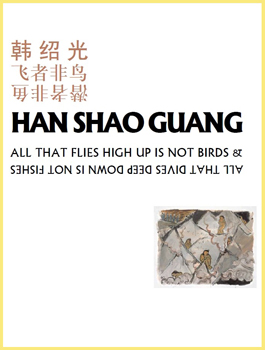内容提要
序
我们正处在一个功名势利笼罩的环境里,任何个人的企图,都将深刻地侵入叙述。带着自己的想法走进别人家谈论,虽然会有许多貌视的“共鸣”,但终究是“隔靴挠痒”的。
如果一个人能独自“旅行”,那么就让他独自吧,远远地欣赏他,已经足够了。因为你看到了另一个独立的生命体走展开
序
我们正处在一个功名势利笼罩的环境里,任何个人的企图,都将深刻地侵入叙述。带着自己的想法走进别人家谈论,虽然会有许多貌视的“共鸣”,但终究是“隔靴挠痒”的。
如果一个人能独自“旅行”,那么就让他独自吧,远远地欣赏他,已经足够了。因为你看到了另一个独立的生命体走过,他和你交叉了一下,然后分道扬镳,这大概才是生命的缘分吧。
回看我们的周身,离开我们用于方便的概念、分类、想象和目标,我们面对的只有“现象”,一些非常原初的现象。虽然小草或蚂蚁也是生命中的另一个类型,但是种群内的生命,依旧是以个体的存在方式表现的。比如我们能够看见的只能是非常具体的一棵一棵的草,一只一只的蚂蚁,一个一个的人⋯⋯
在这本集子里,我们看到了韩老师创作旅途的一个个“驿站”,看到了这些驿站中已经寄存的困惑、迷茫、矛盾、纠结、憧憬、思辨、想象和激情⋯⋯
就像离开了参照,手足无措、随性飘荡,自由落体成了现象。耗散理论创始人伊戈普里高津在研究蚂蚁群体生活中发现,头蚁觅食的路径总是弯弯曲曲甚至迂回的。面对茫茫无际的前方,面对缺乏参照的空间,弯曲迂回的路径是无奈的选择;一旦找到食物,头蚁定位的气息就为后续蚁群带来了工作的捷径,从这里我们看到了承续与创造之间的分道。把这样的观察演绎到人类;人类作为星际空间的一个物质单位,他的开创也像头蚁一样地迷茫。把这样的观察演绎到画家,面对创造,画家也只能象头蚁那样地行为。
这样的处境,对已经习惯并且心仪“教化、常规、方便”的我们来说肯定是恶劣的、恐惧的。但是这样的处境,对创造来说,几乎无法避免。所有涉及创造的工作,在我们的行为词语里变成了“拓荒”,想一想拓荒的时候,面对杂乱无章,没有前兆,没有头绪的时空,我们能说什么呢?难道述说苦乐衷肠、感叹情绪吗⋯⋯
在叙述的空间里,表达总是经由对冲而映照的,它由一个相互的前提导出,比如下列的一些概念:理性和情绪,现象与体验,历史和现状,陈述和无言,依靠和独立,得助和无助,直行和绕道,平齐和参差, 出世和入世, 深究与浅尝,开心和郁闷,信仰与无神,好与坏,是与非,对峙的形式组成了不同的“文本”,也成就了我们不同的眼界,于是《迷思》、《迷失》、《飞者非鸟、潜者非鱼》⋯⋯
还是让画来叙述吧,我们则用心地去聆听!这是唯一可以留下的阐述、也是不会介入陈述“困境”的一个切点。
至此请打开书页,用你的心,用你的眼界“独立”地去阅读,去成就,去演化,去组织,去省悟⋯⋯
在此感谢韩老师给我们带来的、无私的体验奉献!
李静方
2012年春节
Foreword
Surrounded by an environment driven by fame and profit, individuals' intentions will intrude profoundly into their narration. To engage ourselves in others' narration, even if we don't put ourselves in others' shoes, we would still find there is much to sympathize with. Nevertheless, it's something superficial and doesn't really get to the point.
If one is capable of "traveling" alone, let him. We can just watch him from a distance. That's enough. You see a man passing through, you two cross each other on the way, and you move on. That's life.
If putting all the convenient concepts and categorization aside, we find ourselves surrounded by nothing but primitive phenomena. We see things in a very specific way. For instance, we see a blade of grass, an ant and a person.
In this book, we see many "stations" Han once stopped at during his journey in the world of art. It is in these places that his confusion, inner struggles and conflicts, aspiration, logical thinking, imagination and passion lie.
From his study of ants living in big nests, Ilya Prigogine, founder of dissipative structure theory, found out that it took a lot of detours before the ant which was leading the way could find source of food. But as long as it did, ants that followed it would only take the shortest and most convenient way the leading ant found. In a sense, we ourselves are also in such collective motions. For instance, in the case of a painter, if you want to create something, you will have to experience the same confusion and sense of helplessness, and to make the same efforts as the leading ant does.
The situation a pioneer would have to face appears to be intimidating to those who are accustomed to the convenience brought about by rules and customs. But to those who want to create and to explore, it is an inevitable process. Work that involves creation in any way will become a kind of "exploration", which is usually associated with disorder and absence of rules to count on.
Within the realm of narration, the expression of contrasts comes to the fore: the rational and the emotional, phenomenon and experience, history and present, statement and silence, dependence and independence, help and helplessness, shortcut and detour, even and uneven, worldly and unworldly, to investigate and to ignore, merriness and melancholy, belief and atheism, good and bad, right and wrong. All of these contrasts contribute to make various "texts" and broaden our perspectives. In this regard, Myth, Lost, and All That Flies High up is Not Birds & All That Dives Deep down is Not Fishes come into being.
Let the paintings speak for themselves and all we need to do is to be a good listener.
To read, to understand and to achieve the ideals portrayed in the book takes both a peaceful heart and an independent thinking perspective.
I want to extend my warm gratitude to Mr. Han for the brilliant visual experience he's brought to us.
Li Jingfang
January, 2012
收起

 京公网安备 11011302000792号粤ICP备17056390号-4信息网络传播视听节目许可证1909402号互联网域名注册证书中国互联网举报中心
京公网安备 11011302000792号粤ICP备17056390号-4信息网络传播视听节目许可证1909402号互联网域名注册证书中国互联网举报中心